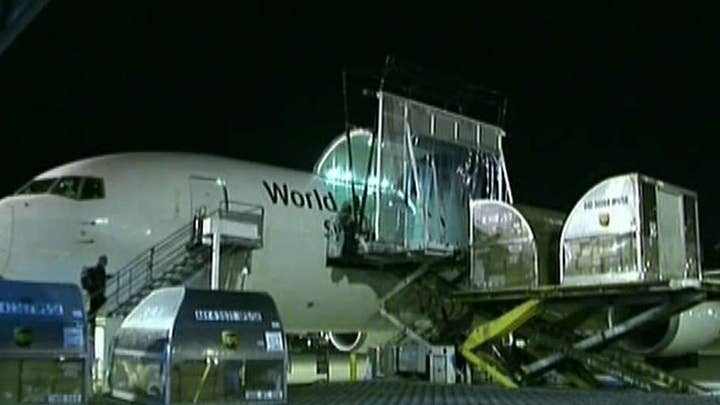
TSA Administrator David Pekoske confirmed the threat from non-metallic explosives targeting passenger jets goes beyond laptops and tablets. (TSA)
The head of the Transportation Security Administration, Administrator David Pekoske, confirmed the threat from non-metallic explosives targeting passenger jets goes beyond laptops and tablets, in an interview with Fox News on Wednesday.
"I think terrorist groups would use whatever they think might be successful and that's how we approach it. If we have specific information, we act on that specific information and if we don't, what else do we think they might use that would be successful? And then we try to close that gap," Pekoske explained.
Pressed on whether non-metallic explosives are being fashioned for carry-on items beyond electronics, such as phone cases, Pekoske answered "right," without elaborating on potentially classified matters.
Pekoske, who took over the position less than a year ago, indicated the non-metallic IED threat is not limited to Al Qaeda and ISIS, with "non-traditional actors" seeking to exploit the potential vulnerability. While the terrorism threat is diversifying, Pekoske said Al Qaeda's interest in commerial aircraft is "not diminished in any way whatsoever; that's still a key focus of any organized terrorist group from everything that I'm aware of. [They] are still very much focused on commercial aviation."
After a wide-ranging speech on the TSA at the Center for Cyber & Homeland Security at the George Washington University in Washington, D.C., Pekoske elaborated on security in public areas of airports where recent successful attacks have taken place -- including Brussels in 2016, where bombs in suitcases killed more than 30 people and wounded some 300 others in the check-in hall.
Pekoske said there would be more visible security in the near term, as the security focus expands beyond checkpoints at the nation's airports.
"Our focus is always going to be on the checkpoint, but the point of my remarks was to not just look at the checkpoint in isolation. We've got to look at the rest of the airport, too, and that includes the public areas of the airport and also the parts of the airport that are behind the checkpoint, sterile areas, from when you leave the checkpoint to when you board the plane and also on the tarmac of airports. So it's really taking a more holistic look at the airport itself."
Asked about the rule limiting liquids on passenger carry-ons, Pekoske said, "I don't see any change in the short or the medium-term but once we get the computer tomography equipment in place, the new X-ray machines that we're testing right now and we hope to buy in large quantities beginning next year, that may change."
He added that getting to the point where people don't need to take their laptops or liquids out of their carry-on bags is still a couple of years away.
Pekoske said of the TSA workforce, "I get a greater and greater appreciation for how difficult the job is that they have and the awesome responsibility they carry on their shoulders... We need to be correct 100 percent of the time and they need to always be completely focused on that mission. In my experience, they are, and I really appreciate the great work they're doing."












































